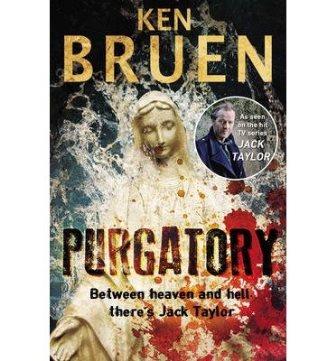
I like narratives with a distinctive voice.
That said, I find narrators with a truly distinctive voice can take a bit of getting used to. My first perusal of the opening pages of Ken Bruen’s ‘Purgatory’ didn’t inspire me to read further and I let most of the month slip by, reading other things, until the deadline presented by my crime reading group came sharply into focus.
What’s it about?
Someone calling themselves C33 is killing crooks in Galway. Ex-guard Jack Taylor isn’t interested in getting involved, despite receiving personal notes from the killer suggesting he might like to ‘play’. Jack’s friend, Stewart, is interested and courting danger. Will Jack help him solve the case?
Meanwhile, Reardon, a billionaire determined to buy up Galway, is intent on turning Jack into his pet, and Jack begins a relationship with Kelly, Reardon’s assistant. But what do these two really want with Jack Taylor?
What’s it like?
Unsurprisingly, considering its positioning as noir fiction, the tone and content is dark, miserable and violent. Bruen isn’t afraid to maim and / or kill off his characters and those who survive seem to mostly spend their time drinking and drugging themselves into oblivion. Jack in particular begins the book ‘on the wagon’, but it isn’t long before he’s stumbling along beside it.
This is the tenth book in Bruen’s ‘Jack Taylor’ series so fans will doubtless be used to their anti-hero’s rather sweary nature and ability to survive anything the city’s mad men and semi-corrupt cops can throw at him. In a previous outing he has evidently lost some fingers and his desire to be a PI – his ostensible trade. In fact, it is not until page 253 of 283 that Jack notes laconically: ‘Finally did a detective thing’. Clearly, Bruen recognises that his character’s role up to this point has been more passive drunk than active investigator.
It is not until page 253 of 283 that Jack notes laconically: ‘Finally did a detective thing.’
This hint of metafictionality grows throughout ‘Purgatory’. Each short chapter is prefaced with one or two quotations, taken from literature, Irish sayings and songs, celebrities and, um, characters from this book. In the final chapters, Jack, our first-person narrator, begins to refer to old cases by the names of earlier books in the series. Somehow this feels quite appropriate in a story already littered with cultural references: Jack’s life seems to partly consist of watching a string of drama series that were axed after one or two seasons; Kelly has a thing for Oscar Wilde; and these two characters visit a bookshop that happens to have a display of noir fiction in the window. Perhaps Jack’s cultural engagement is meant to show the reader that, despite his professed skill with the hurley, he is redeemable.
The frequent references to political and sporting events root this novel firmly in a particular time period which feels relevant now but will mean it dates quite quickly. Given Bruen’s success and that of the hit TV series based on this character, I doubt that’s a concern. There is also a very strong sense of place, though not necessarily a place you’d want to live in. Galway is vividly rendered through its population: the Guards, the drunks, the bartenders and baristas who adopt new customs that horrify Jack.
Final thoughts
Bruen writing as Jack Taylor adopts an abrupt style which is somewhat lacking in verbs. This is a typical extract:
Before she could speak, I said
‘No.’
Knocked her back.
Her mouth made a small O of surprise. I knew the gig.
The touching photo.
Some heart-kicking story.
Her son/daughter/husband
missing
was a great/caring/loveable individual,
and
could I find them, what happened to them?
The whole usual awful parade of misery.
It took maybe fifty pages for me to acclimatise to this style, which isn’t as long as it sounds; if all the sentences in this book were bundled into regular sized paragraphs, the book itself would be at least two thirds shorter. Once I had adapted, Jack’s distinctive voice and dark humour were a good enough reason to keep reading, despite a rather slim plot.
As a hard-boiled anti-hero, Jack succeeds brilliantly.
As a hard-boiled anti-hero, Jack succeeds brilliantly. He is persistently blind to his friends’ predicaments, though usually at least partly responsible, always ready to sink into alcohol and / or narcotics induced oblivion, and cavalierly unconcerned about his own welfare. Flashes of morality twinkle at readers, signalling a decent man at heart, but I hope in future additions to these series he might actually, y’know, actively attempt to solve a crime or two. (In fairness, he does solve this one, though it’s largely by accident.)
Overall, this is a good example of the noir genre with sufficient world-weary gone-slightly-bad-and-mad-ex-upholder-of-the-law antics to keep readers interested.
The ending is a little frustrating as Bruen throws in a last minute shock, evidently designed to bait the hook for book eleven. Yawn. Presumably regular readers will now be clamouring to know the next publication date, but I have always found such last-second dramas off-putting and thought its inclusion here was a bit of a shame. Doesn’t Bruen trust his readers to seek out the next instalment? (Disclaimer: I did once hurl a remote control at a TV because I was so frustrated by the huge cliff-hanger at the end of a TV series. At that point I decided cliff-hangers used in this way were Awful Things.)
What do you think? Are last-second dramas gripping or eye-roll inducing?